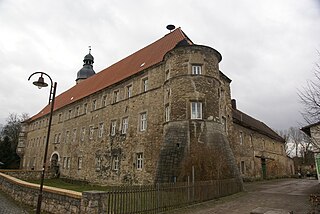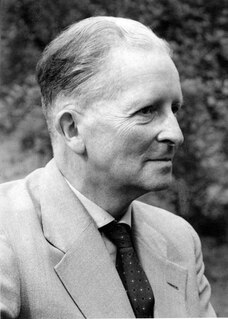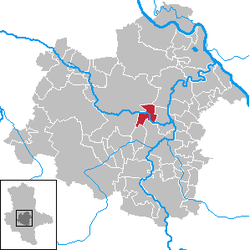
Ludolf Hermann Emmanuel Georg Kurt Werner von Alvensleben was an SS functionary of Nazi Germany. He held positions of SS and Police Leader in occupied Poland and the Soviet Union, and was indicted for war crimes including the killing of at least 4,247 Poles by units under his command.

Ventry, officially Ceann Trá, is a Gaeltacht village in County Kerry, Ireland, on the Dingle Peninsula, 7 kilometres west of Dingle. Due to its long sandy beach, Ventry is a popular tourist destination. The town is connected to Dingle via the R559 regional road.

Haldensleben is a town in Saxony-Anhalt, Germany. It is the administrative seat of the Börde district.

Gardelegen is a town in Saxony-Anhalt, Germany. It is situated on the right bank of the Milde, 20 m. W. from Stendal, on the main line of railway Berlin-Hanover.

Nienburg is a town in the district of Salzlandkreis in Saxony-Anhalt, Germany. It is located in the lower Saale valley, approx. 5 km northeast of Bernburg. In January 2010 it absorbed the former municipalities Gerbitz, Latdorf, Neugattersleben, Pobzig and Wedlitz, that became Ortschaften or municipal divisions of the town. In 2020 its population was 6,104.
Ludolf is a Germanic surname or given name. It is derived from two stems: Hlud meaning "fame" and olf meaning "wolf". An alternate spelling of the name is Ludolph. People with the name include:

Wittstock/Dosse is a town in the Ostprignitz-Ruppin district, in north-western Brandenburg, Germany.

Calvörde is a municipality in the Börde district of Saxony-Anhalt, Germany. It is part of the Verbandsgemeinde Flechtingen.
von Alvensleben may refer to:

Erxleben is a municipality in the Börde district in Saxony-Anhalt, Germany. On 31 December 2009 it absorbed the former municipality Bregenstedt, followed by the former municipalities Bartensleben, Hakenstedt and Uhrsleben on 1 January 2010. The municipality consists of the Ortsteile Bregenstedt, Erxleben, Groß Bartensleben, Groppendorf, Hakenstedt, Klein Bartensleben and Uhrsleben.

Wichard von Alvensleben was a German agriculturist, Wehrmacht Officer, and Knight of the Order of Saint John. He was a member of the aristocratic House of Alvensleben, one of the oldest in Germany.

Gustav von Alvensleben was a Prussian General der Infanterie.

Ludolf Arthur Herman von Alvensleben was a Prussian major general from the German noble family von Alvensleben who was born in Potsdam and died in Halle an der Saale. He was married to Antoinette, Baroness of Ricou (1870–1950), with whom he had four children including SS general Ludolf von Alvensleben, an escaped Nazi war criminal (1901–1970).

The Schochwitz castle, located in Schochwitz, Germany was built in the 12th century. Today it serves as a hotel.

The Oberhof Ballenstedt is a stately home next to the town hall in Ballenstedt in the German state of Saxony-Anhalt.

The House of Alvensleben is an ancient, Low German (niederdeutsch) noble family from the Altmark region, whose earliest known member, Wichard de Alvensleve, is first mentioned in 1163 as a ministerialis of the Bishopric of Halberstadt. The family name derives from Alvensleben Castle. They are one of the oldest extant German aristocratic families.

Calvörde Castle is located in Calvörde in the German state of Saxony-Anhalt. Its existence was first recorded in the late 13th century. In the Late Middle Ages and Early Modern Period it was frequently fought over due to its location between the territories of Brandenburg, Magdeburg and Brunswick.

Hermann Korb was a German architect who worked mainly in the Principality of Brunswick-Wolfenbüttel.

Gebhard XXV. von Alvensleben was Magdeburg Privy Councilor, aristocrat and historian. Belonging to the House of Alvensleben, he succeeded his father Gebhard XXIII. von Alvensleben as Archbishop of the Roman Catholic Diocese of Magdeburg in 1627.

Udo August Ernst von Alvensleben was a German art historian.






















